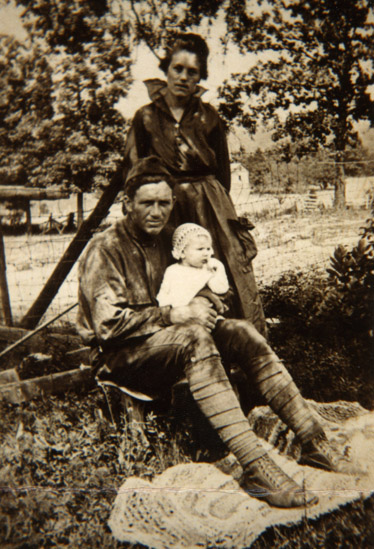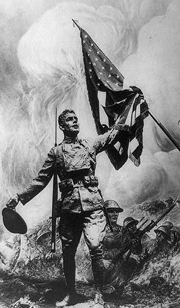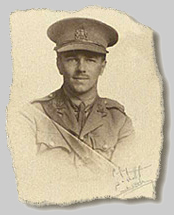This is being noted a day late, but it makes some good points — Why doesn’t the US observe Armistice Day? We’re more comfortable with war than peace.
Category Archives: Armistice Day
It’s Armistice Day
2014 marks 100 years from the start of World War I, btw.
Here are a couple of good articles to keep you going while I’m doing other things —
Josh Marshall, “Forget the Chatter, This is the Democrats’ Real Problem”
Edwin Lyngar, “I was a conservative coward: How the midterms evoked my past of shame, terror and Fox News“
It’s Armistice Day
My Grandpa finally home from the Western Front, some time in the summer of 1919, with Granny and my Dad. (Look at all the crochet stuff! Granny used to crochet a cover for anything that stood still for more than ten minutes. I still have a shawl she crocheted stored away somewhere.)

ALso, too, do read Gary Wills, “What Romney Lost.”
It’s Armistice Day

It’s Armistice Day. Click here for a Wilfred Owen retrospective. See also last year’s post.
The soldier in the photograph above is my grandfather, Cpl. Robert John Thomas, on the day he returned from France in 1919. The lady with him is my grandmother, Dora Sabina Senter Thomas, and the baby is my father, Robert Thomas, born while Grandpa was on the Western Front. (My father never got a middle name because Grandpa didn’t like his middle name and didn’t want Grandma using it. And since Grandpa wasn’t available for consultation when Dad was named, the middle name got left out.)
It will be a few weeks yet before we know the plan for withdrawal from Iraq. In the meantime, props to The American Conservative for its retrospective on Bush’s War and the best headline I’ve seen today: “He Fought the Wars and the Wars Won.”
Armistice Day
 It’s Armistice Day. Click here for a Wilfred Owen retrospective. More here.
It’s Armistice Day. Click here for a Wilfred Owen retrospective. More here.
James Fallows has some observances on the day here.
Originally this was a moment for looking backwards, to honor those who had served in the Great War and mourn those who had died. Its retrospective purpose remains. But for Americans right now it should also be a moment to honor the men and women who continue to serve and sacrifice and be injured and die — and to reflect on the fact that, for the first time in our modern history, they do so with absolutely no shared sacrifice or service from the public at large. Everyone knows this and avoids thinking much about it. Today it’s worth at least remembering.
It’s also worth thinking about how warfare itself has changed. In 1918, several warring nations agreed that the war would stop on the eleventh hour of the eleventh day of the eleventh month. But it’s unlikely our current military actions will end with an armistice. Wars will just go on, and on, until changing circumstances cause people to lose interest.
For that reason, war can no longer be thought of as an extraordinary event of limited duration that will end on some day future generations will have to memorize for history tests. From now on, we must understand that when we choose to engage in a large military action there may not be an end to it for many years. Certainly, there can be exceptions to this. If a war has a narrow and sharply defined mission — running Saddam Hussein out of Kuwait, for example — then a war might still be of limited duration. When the mission is more grandiose and less specific — ending evil, spreading democracy, making the world safe from terrorism — then don’t expect to live long enough to see the end of it. Unless, of course, we just stop fighting it.
And for that reason, “we’re at war” can no longer be an excuse for playing fast and loose with the Constitution. It was controversial enough when Lincoln and Franklin Roosevelt assumed extraordinary “war powers” that would be relinquished when the wars ended. When President Bush expands the powers of the presidency, he is in effect changing the way powers are balanced and separated from now on. Because our wars will have no armistice, no formal conclusion dignified with treaties and ceremonies, war powers will not be relinquished unless some future President chooses to do so. Or, unless Congress and the Courts force the President to relinquish them.
On the other hand, without shared sacrifice on the part of civilians, war and the sacrifice of soldiers can too easily be put out of mind. For those not directly involved, perpetual war could become just another part of the constant drone of issues emanating from mass media. And that makes it too easy.
From an editorial in the Lufkin Daily News:
One in four of our nation’s homeless people is a veteran, according to a study released this past week, and soldiers returning from the current conflicts in Iraq and Afghanistan are becoming destitute more often and more quickly than veterans of past wars. …
… Part of the problem, a big part, is that war has become so commonplace for our country. The wars we are fighting now have no end in sight, and the daily news has hardly changed since they began: U.S. soldiers are dying at a slow but steady rate. Most the country is against the war, and the absence of a military draft means the people who are serving are doing so by choice. That, unfortunately, makes it easier for us to disregard the sacrifices they are making.
Another issue is that, while local organizations (namely, the Angelina County Veterans Day Committee and local school districts) do a great job of putting together ceremonies to recognize our veterans, it’s like pulling teeth to get members of the public to attend them. Then there are the other 364 days of the year on which we think, and do, very little about veterans’ needs.
Taking care of returning veterans should be a high priority for government, not a job delegated to volunteers or Veterans Day committees. Veterans should not have to ask for charity.
See also Vietnam Memorial Turns 25.
Update: See also John Nichols.
Update 2: Commander Jeff Huber, U.S. Navy (Retired), quotes Kurt Vonnegut’s Breakfast of Champions:
I will come to a time in my backwards trip when November eleventh, accidentally my birthday, was a sacred day called Armistice Day. When I was a boy…all the people of all the nations which had fought in the First World War were silent during the eleventh minute of the eleventh hour of Armistice Day, which was the eleventh day of the eleventh month.
It was during that minute in nineteen hundred and eighteen, that millions upon millions of human beings stopped butchering one another. I have talked to old men who were on battlefields during that minute. They have told me in one way or another that the sudden silence was the Voice of God. So we still have among us some men who can remember when God spoke clearly to mankind.
Armistice Day has become Veterans’ Day. Armistice Day was sacred. Veterans’ Day is not.
Commander Huber continues,
I have this little veterans’ memorial along the edge of my yard. It’s where I put in some new plants early in the fall, so they’d be established when winter came and then bloom when spring rolls around. Puttering around the garage while I was in the middle of this yard project, I found a miniature U.S. flag on a small stick, one of those things you see real estate agents plant a million of in everybody’s yard on the Fourth of July. I’d saved this one from the Fourth, for some reason. Anyway, there it was on a shelf in my garage, and I picked it up and took it out where I’d just put all the new plants and stuck it in the ground, where it has stayed 24/7 ever since.
I think of this little plot as my memorial to everyone I personally knew who died in uniform. None of them died in combat. Most of them died in “training accidents,” mainly aviation related, things like disappearing into the side of a mountain or flying to the bottom of the ocean.
I keep thinking someone who thinks he’s really, really patriotic will come along someday when I’m in the yard playing with my dogs or something and tell me how I’m not treating the flag properly, that I should know better than to leave it outside day and night, rain or shine, what with me being a veteran and all.
I can’t wait to see the look on that person’s face when I say what I have to say in reply to that. It should be pretty comical, the look on the face of that person who thinks he’s so all fired patriotic.
That person might look like he just heard the Voice of God.
Armistice Day
Dan Froomkin’s Friday column is mostly an excerpt from the book Operation Homecoming: Iraq, Afghanistan, and the Home Front in the Words of U.S. Troops and Their Families. May they all come home safely, and soon.
This bit is by Sgt. Sharon D. Allen:
The camp is under red-lens light discipline, which means we can’t use an unfiltered flashlight. It severely lessens our evening entertainment options. So, soon after we arrived, we began our strange nightly gatherings. You won’t find it on any schedule, but you can set your watch by it. As the sun nudges the horizon and the gravel cools, some of us give up our battle with the ambient light and surrender our reading until the morning. Others collect up their poker winnings or grumble about their losses. And we all drag our chairs and cigarettes and joylessly warm water out to the gravel and talk. We call it “the circle.” In the Army there is an incredibly varied cross section of society, and we are a diverse group. We have a couple kids straight out of high school, who’d either joined to get a little excitement out of life or to get a leg up on it so that they could go to college. We have older guys, who’ve already put in their time. They tend to be either jaded or genial, both in reaction to the accumulated bullshit slung at most soldiers who’ve been in the service for years. We have everyone from idealists to realists to fatalists, more than a few who began at one end of the spectrum and eventually meandered their way to the other.
I always find it amusing when people talk about “the military” vote, perspective, or whatever. My company has 170-some soldiers, and 170-some opinions. We might have more invested in foreign policy than people back home, but that doesn’t mean we all agree on exactly what those policies should be. Two of the guys, Jeff and Sam, are brothers serving together here but in different platoons. They are both slightly to the left of extremely conservative, yet also very anti-Iraq war. Their father threatened to cut off his own head and send it in to Al-jazeera if his sons aren’t returned home soon.
Be sure to read the whole excerpt. The soldiers are asking the same questions about the war that we are (or should be).
There are some on both the Left and the Right — I think the Right is worse, actually — who speak of “the troops” as if they were an army of identical clones. For example, last week rightie bloggers declared that the Gannett-owned military Times newspapers don’t speak for “the troops,” as if they and they alone were authorized to declare who speaks for whom in the military. Just after the Tuesday election, I caught a couple of rightie posts (can’t find them now, sorry) declaring that “the troops” in Iraq were upset by the results because they didn’t want to come home before “the job” was done.
What a pile of manure. “The troops” are individuals who come to their own conclusions. Some want to continue military operations in Iraq, and some don’t. Some think the invasion was necessary, and some don’t.
You know I think the invasion of Iraq was a mistake. But speaking of war generally, I say — if you’re going to have a war, have a war. If the situation is so dire that a war must be fought, then the strength and resources of the entire country should be marshaled to fight the war and get the bleeping thing over with as quickly as possible. Every single day, every citizen should be reminded that our soldiers are fighting for us, and should be asked to give something to the effort. If recruitment goals fall short, then crank up the draft. There should be bond drives and oil rationing. There should be cookie baking and sock knitting, and children should donate their lemonade stand money for the troops.
And if the situation isn’t dire enough to go to that amount of trouble, then maybe we shouldn’t be fighting the bleeping war to begin with.
Suggestion: Donate to the USO.
From the archives: Wilfred Owen.
Armistice Day
 It’s Armistice Day. Click here for a Wilfred Owen retrospective. More here.
It’s Armistice Day. Click here for a Wilfred Owen retrospective. More here.
Today the French are pleading for calm. The Brits observed two minutes of silence at the eleventh hour this morning.
In Maine, police had to intervene when a group of VFW members tried to remove 2,000 white flags placed at veterans’ cemetery in remembrance of U.S. soldiers who’ve died in Iraq.
I think Wilfred Owen would have appreciated the flags.
